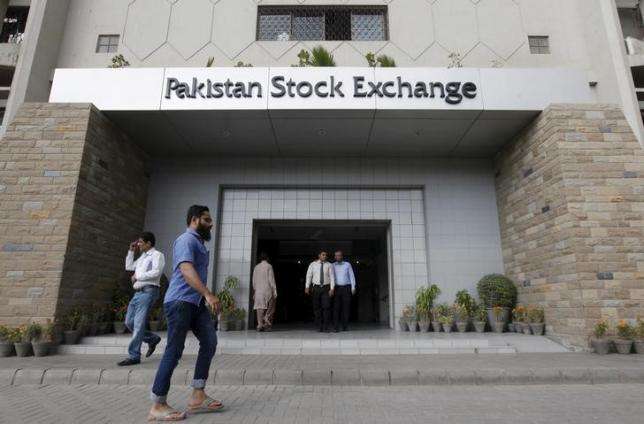
|
Getting your Trinity Audio player ready...
|
Introduction
The Pakistan Stock Exchange (PSX) experienced significant volatility on Tuesday, with the KSE-100 index recording a sharp decline of nearly 1,100 points. This downturn came after a series of global equity sell-offs, rising geopolitical tensions in the Middle East, and disappointing domestic remittances data. Market participants showed increased caution as they considered various factors that may contribute to market instability in the short term.
In this article, we will delve into the reasons behind the sharp fall, explore the factors contributing to the volatile trading session, and analyze the future outlook of the stock market. We will also discuss the role of profit-booking and how the global and domestic economic environment has been affecting investor sentiment.
Reasons Behind the PSX Decline
Geopolitical Tensions and Global Equity Sell-Offs
A key factor driving the bearish sentiment at PSX was the escalation of geopolitical tensions, particularly in the Middle East. As global markets react to these tensions, equity markets in many regions, including Pakistan, witnessed significant sell-offs. Investors, fearing further instability, began pulling out of equities, leading to a sharp decline in the KSE-100 index.
Global equity markets, especially in Europe and the United States, showed signs of distress, with investors focusing more on risk management rather than growth opportunities. This global trend had a direct impact on investor sentiment in Pakistan, contributing to the sharp decline.
Weak Domestic Remittances Data
Another important factor that influenced market movement on Tuesday was the disappointing domestic remittances data for November. According to reports, remittances fell by 5% month-on-month, which raised concerns about the overall economic health and consumer spending in Pakistan.
Remittances are a crucial part of Pakistan’s economy, and any decline in this area often signals trouble for the country’s economic stability. Investors were particularly worried about the long-term implications of lower remittance inflows, which could negatively impact both consumer confidence and domestic consumption.
Concerns Over Tax Collection Shortfall and IMF Targets
In addition to the global and domestic economic factors, market participants were also worried about a potential shortfall in the government’s tax collection. With the fiscal year well underway, analysts warned that the government may not meet its tax targets, which could further strain Pakistan’s financial situation.
Moreover, Pakistan’s continued reliance on the International Monetary Fund (IMF) for financial assistance has raised concerns over the country’s economic future. The unresolved issues surrounding the IMF’s $7 billion Extended Fund Facility (EFF) have left investors uncertain about the country’s financial stability.
Profit-Taking Amid Volatile Trading
Despite the initial bullish momentum in the trading session, profit-taking began to dominate as the day progressed. After some key sectors showed strong performance, especially in the early part of the day, investors decided to lock in their gains. This led to a sharp decline in the KSE-100 index, which oscillated within a massive 4,000-point range during the session.
Banking Sector Concerns
The banking sector was also under pressure, primarily due to concerns about the advance-to-deposit ratio (ADR). Several banks, including Bank AL Habib, MCB Bank, UBL, and Bank Alfalah, were affected by this issue and saw their stock prices decline significantly.
Key Sectors Affected
Auto Sector Struggles
The auto sector witnessed a significant pullback, with Sazgar Engineering closing 5.5% lower. This was attributed to a decline in the month-on-month sales of four-wheelers. The company reported a drastic drop in sales, from 1,002 units sold in October to just 584 units in November.
This decline in auto sales was a contributing factor to the overall market downturn. The slowdown in the auto sector reflects broader challenges within the domestic economy, including inflation, high interest rates, and weak consumer purchasing power.
Energy Sector Performance
Despite the overall decline in the market, there were some positive performances in key sectors. Mari Petroleum, Lucky Cement, Attock Refinery, Systems Limited, and The Searle Company contributed positively to the index’s movement, adding a total of 508 points.
However, UBL, Bank AL Habib, MCB Bank, Engro Fertilisers, and Engro Corporation acted as the primary detractors, dragging the index down by 629 points. The fluctuations in these major stocks reflect the challenges faced by individual sectors, ranging from energy and banking to cement and fertiliser.
Market Outlook and Future Predictions
Analyst Insights on the Market’s Future
Ahsan Mehanti, an analyst at Arif Habib Corp, pointed out that the recent stock market decline could be seen as a short-term correction. Despite the downturn, he noted that market consolidation and improving macroeconomic indicators could support investor sentiment in the coming months. The decline in remittances and geopolitical tensions are likely to affect the market in the short term, but the long-term outlook remains cautiously optimistic.
Other analysts believe that the market could experience a recovery if the government can address key issues such as tax collection shortfalls and meet IMF targets. Additionally, the possibility of further interest rate cuts and improvements in inflation could provide some support to the stock market in the next few months.
Key Levels to Watch
Looking ahead, analysts have pointed out that the KSE-100 index faces key support at the 107,000-point level. If the market can hold above this level, there is potential for a recovery. However, a breach of this support level could indicate further downside pressure in the short term.
FAQ Section
1. Why did the Pakistan Stock Exchange experience a significant fall?
The Pakistan Stock Exchange (PSX) saw a sharp decline due to a combination of global equity sell-offs, rising geopolitical tensions in the Middle East, weak domestic remittances, and concerns about the government’s tax collection and IMF targets.
2. How did the banking sector perform on Tuesday?
The banking sector was under pressure due to concerns about the advance-to-deposit ratio (ADR). Major banks like Bank AL Habib, MCB Bank, UBL, and Bank Alfalah saw their stock prices decline.
3. What is the outlook for the auto sector?
The auto sector is facing challenges due to lower sales in key companies, such as Sazgar Engineering, which reported a sharp drop in four-wheeler sales. However, the long-term outlook depends on economic conditions and consumer purchasing power.
4. What factors could help stabilize the market?
The market could stabilize if the government addresses issues such as tax collection shortfalls, improves remittances inflows, and meets IMF targets. Additionally, further interest rate cuts and improvements in inflation could help boost investor sentiment.
5. What is the support level for the KSE-100 index?
The KSE-100 index faces key support at the 107,000-point level. If this support holds, there is potential for a market recovery. A breach of this level could indicate further downside pressure.
Conclusion
The Pakistan Stock Exchange’s decline on Tuesday was driven by a mix of global and domestic factors. Geopolitical tensions, weak remittances, and concerns over tax collection and IMF targets played a significant role in the bearish sentiment. However, despite the recent market turmoil, analysts remain cautiously optimistic about the long-term prospects, provided key economic challenges are addressed. Profit-taking was a dominant theme, but investor confidence remains intact as the market adjusts to these short-term challenges.
MUST READ
https://skipper.pk/2024/12/11/surge-in-passenger-car-sales-49-7/






